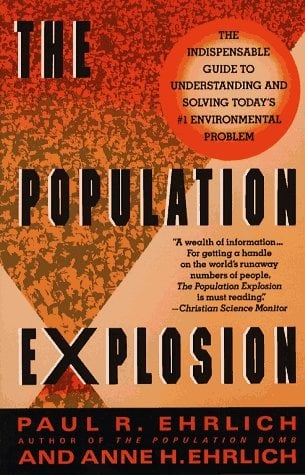Twenty-two years ago Paul Ehrlich published The Population Bomb. In an effort to dramatize his thesis, he included a number of scenarios about the future. These tended to obscure the thrust of his work, for many viewed them as predictions. When they failed to come to pass, it was easy—especially for conservatives—to conclude that Ehrlich’s basic message was wrong.
Since the end of the Second World War, the earth’s human population has soared. In 1945 there were approximately 2.4 billion people; by 1968, when The Population Bomb appeared, the number had grown to 3.5 billion. Now there are 5.3 billion and 95 million more are being added annually. Yet, while population has been surging, the number of net food-exporting regions has shrunk. Fifty years ago Europe was the major importer of grain and Asia, Africa, and Latin America, along with North America, had surplus crops to sell. This is no longer the case. Today there are fewer than ten reliable food exporters (the United States, Canada, the European Economic Community, Australia, New Zealand, Argentina, and Thailand). And their ability to produce surpluses indefinitely is by no means assured. In The Population Explosion, Paul and Anne Ehrlich, both of whom are associated with Stanford University, argue that the earth’s virtually unrestrained population growth is the root cause of potentially calamitous environmental problems. If we do not address this issue head on, they suggest that natural forces, such as even more widespread famine and disease, will take their inevitable toil and bring human numbers into balance with the world’s carrying capacity.
The authors link overpopulation to an alarming array of environmental phenomena: acid rain, ozone depletion, draining of groundwater reservoirs, the loss of topsoil (25 billion tons yearly), desertification and deforestation, and the “fecal snow” (windblown human excrement) that blankets Mexico City. Much of the damage appears to be irreversible, and substitutes for damaged resources—such as for fresh water—are not available at any price.
Those who have been lulled into complacency by the arguments of the Alfred E. Newmans of neoconservatism—Julian Simon and Ben Wattenberg—should pay especial attention to chapters four through eight of this book, which review such matters as food and the ecology of agriculture, population and public health, and “Growthism” and national security. Now that almost all of the reasonably arable land is being farmed, the seas are being vacuumed of edible fish, and another eighty thousand square miles of land are being reduced to zero economic productivity every year, we cannot airily dismiss expressions of concern with overpopulation as manifestations of environmentalist hysteria. The mass migration from the Third World to the United States, Canada, and Northwestern Europe represents a movement not of “freedom lovers” (why don’t they stay where they are and build republican institutions throughout Asia, Africa, and Latin America?) but of people looking for space in what are the most habitable remaining parts of our planet.
The Ehrlichs are better at describing some of the ways in which overpopulation affects our natural resource base than they are at providing pointers on how to deal with the problems they identify. They sprinkle their concluding chapters with liberal cant about racism, sexism, and economic inequality; advise Americans that we shouldn’t try to halt illegal immigration from Mexico; encourage readers to tease their relatives and friends who have more than one or two children; and call for the establishment of some sort of Global Commons Regime.
The Population Explosion provides useful information and may help to focus attention on the importance of the population factor on present and future world events. But as Garrett Hardin has pointed out, many “global” problems, including that of population density, are matters that are best dealt with at the local and national level. We cannot dictate to others how to live. Nor should our generosity and concern for the plight of others blind us to the need to preserve the best of what we have. As Hardin remarks in Stalking the Wild Taboo, “It is unlikely that civilization and dignity can survive everywhere; but better in a few places than none. Fortunate minorities must act as the trustee of a civilization that is threatened by uninformed good intentions.”
[The Population Explosion, by Paul R. Ehrlich and Anne H. Ehrlich (New York: Simon and Schuster) 320 pp., $18.95]

Leave a Reply